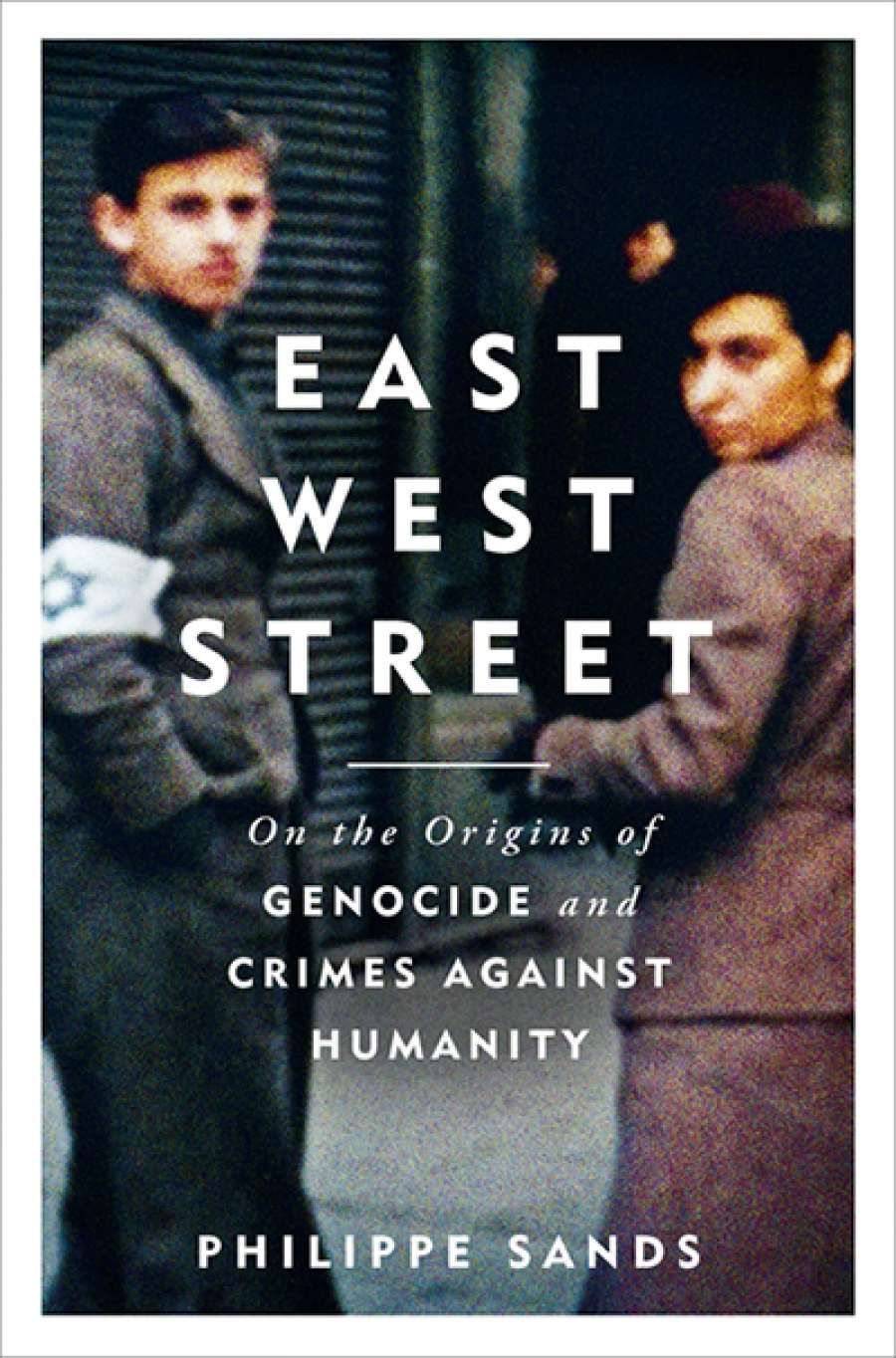
- Free Article: No
- Contents Category: Law
- Custom Article Title: Neil Kaplan reviews 'East West Street: On the origins of genocide and crimes against humanity' by Philippe Sands
- Custom Highlight Text:
Philippe Sands, a barrister and Professor of International Law at University College London, brings together in this multi-faceted book the perpetrators of the worst crime yet devised by man ...
- Book 1 Title: East West Street
- Book 1 Subtitle: On the Origins of Genocide and Crimes against Humanity
- Book 1 Biblio: Weidenfeld & Nicolson, $32.99 pb, 494 pp, 9781474603553
Lemkin, after developing a successful legal career in Poland, joined the Polish army and defended Warsaw during the German siege of that city. He managed to escape Poland and to make his way to the United States, where he continued his legal career.
Importantly, both Lauterpacht and Lemkin were directly involved in the Nuremberg trials. Lauterpacht assisted Sir Hartley Shawcross, the UK Attorney General, and David Maxwell Fyfe, the Solicitor General, in the preparation of the charges for the Nuremberg trials in 1946. Lemkin, to a lesser extent, assisted the American prosecution team.
As described by Sands, both men contributed tremendously to the basic notion that the State, under the guise of sovereignty, is not free to run roughshod over its population. It was Lauterpacht's idea to insert the term 'crimes against humanity' into the Nuremberg statute – a phrase that criminalises the mass killing of civilians, such as the extermination of millions of Jews by the Nazis. Lemkin coined the word genocide (genos, Greek for race, and cide, Latin for killing) and advocated fiercely that the Nazi leaders should face the charge of genocide. Subsequently, Lemkin introduced a draft of what later became the 'Convention on the Prevention and Punishment of the Crime of Genocide' (1948).
 The Ukranian city of Lviv today (photograph by Jan Mehlich, Wikimedia Commons)
The Ukranian city of Lviv today (photograph by Jan Mehlich, Wikimedia Commons)
In this readable and exciting account, Sands highlights the distinction between the crime of genocide and crimes against humanity. While genocide is focused on the protection of groups, crimes against humanity is based on the protection of the individual. Lauterpacht favoured the use of crimes against humanity in the Nuremberg trials due to its focus on the individual and because genocide was not sufficiently rooted in customary international law and contained various doctrinal problems. Perhaps due to those doctrinal problems, the Nuremberg judgment did not include any reference to the crime of genocide (although it had been argued and supported by three of the four prosecuting powers). Lemkin was terribly disappointed by this omission and by the fact that the judgment did not cover the crimes committed before the war. Lemkin said that the verdict was 'the blackest day' of his life.
Nevertheless, the idea that leaders cannot commit crimes against their own population and hide behind the shield of sovereignty became a reality at Nuremberg and has continued to develop ever since. For example, in 1998, the International Criminal Tribunal for Rwanda convicted Jean-Paul Akayesu for the crime of genocide. In 1999 Slobodan Milošević was indicted for crimes against humanity and, after he left office, genocide. Milošević was the first sitting head of state to be indicted for international crimes.
A crucial character in the story is Hans Frank, Hitler's lawyer and Governor of Poland, who was responsible for the death of most Polish Jews. From a lawyer's standpoint, Frank was the more despicable because he attempted to provide a legal basis for the Nazi regime. Much of his thinking was set out in his diaries, which were a useful tool for the prosecution. Although Sands lost members of his family because of Frank, he met his son and they discussed what is was like to be the child of what history terms a monster. Remarkably, the two men developed a friendship as a result of the meetings that are described vividly in the book.
Sands's fascination with the role of lawyers in facilitating international crimes is not new. In his excellent book Torture Team: Deception, cruelty and the compromise of law (2008), Sands examined the involvement of lawyers in the treatment of prisoners in Guantánamo Bay. In East West Street, Sands's focus on Frank provides us with another example of how the law can be used not only to commit and justify horrendous crimes, but also to provide justice and protect human rights.
Finally, Sands writes about members of his family who did escape from Poland. He recalls his grandfather, who lived in Paris and was always reluctant to explain how he and the author's mother escaped the Nazis. Sands assumes the role of sleuth in establishing how his mother arrived in England.
Sands's skills as a barrister and arbitrator, and his keen eye for detail and fact, make East West Street an absorbing book. Extremely well researched, at times it reads like a detective story. Sands pieces together a fascinating story which combines family memoir, a history of the birth of modern international criminal law and human rights law, and a biography of two of the most important lawyers of the twentieth century and one of the most notorious lawyers.


Comments powered by CComment